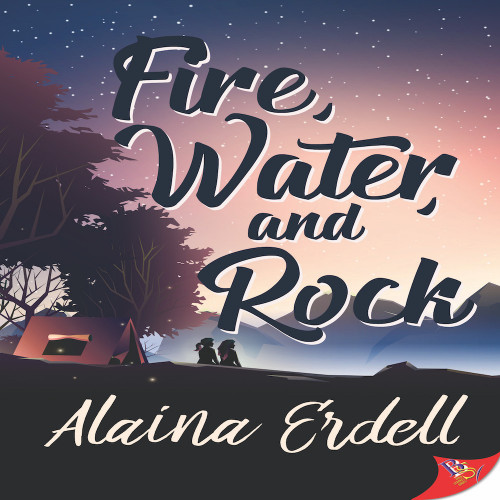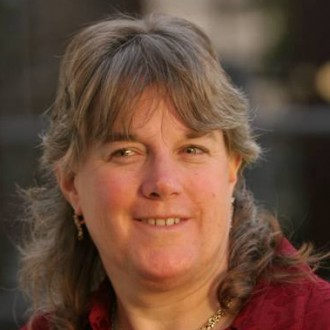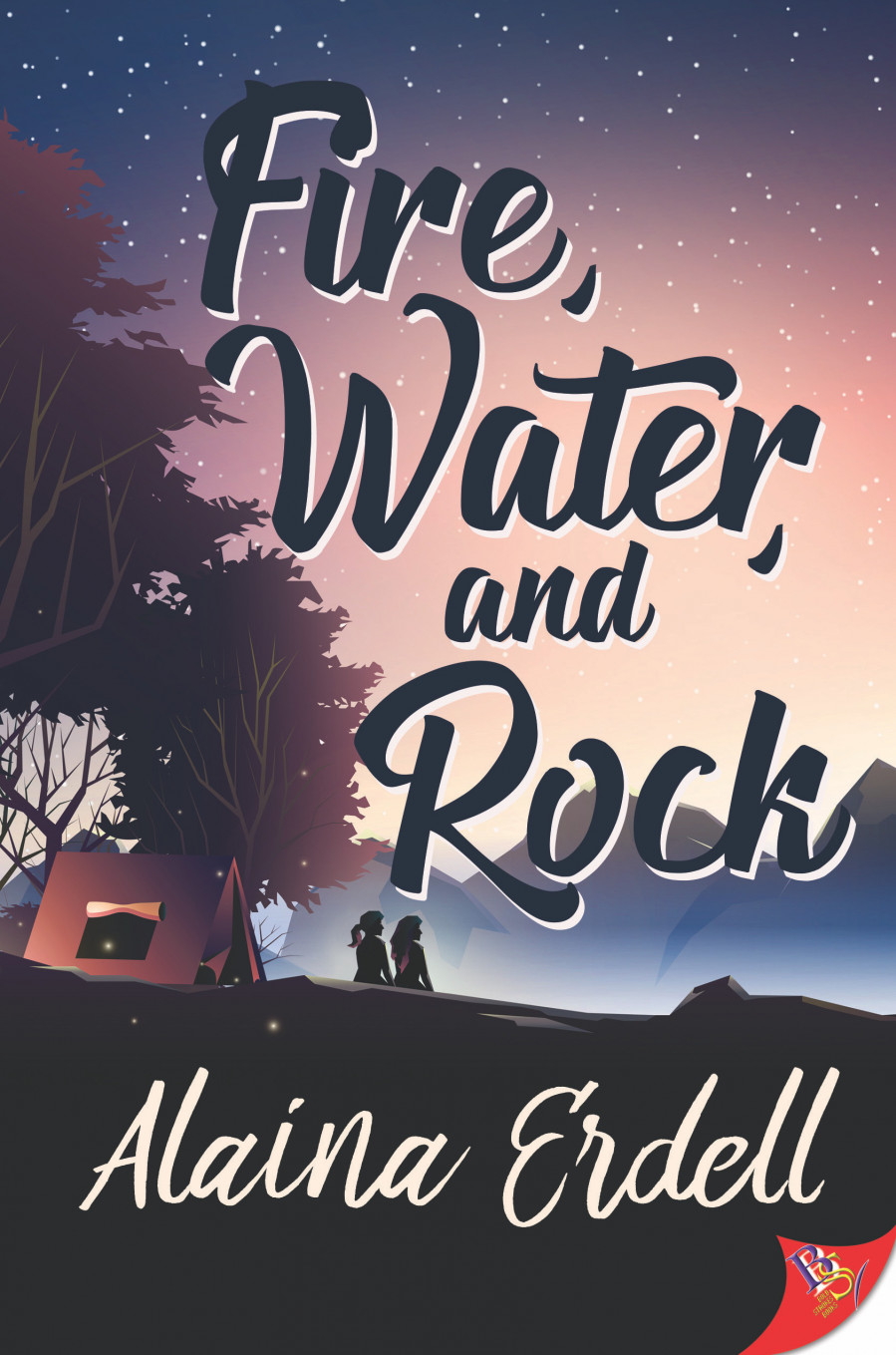Jeannie Levig interviews Alaina Erdell
Here we are, back on the Bold Strokes Books Author Blog, and today, I’ll be speaking with new author Alaina Erdell.
Hello, Alaina, and congratulations on your debut novel, Fire, Water, and Rock, a new December release. First of all, how are you feeling about the release and being a published author?
Thank you. I’m equal parts excited and nervous. Thinking of myself as a published author is still a bit surreal. To be able to do what I love feels like a dream come true.
It feels like I’ve been waiting for the release for so long, so I’m eager for it to be here. It’s gratifying to work so hard on something and see it come together so nicely thanks to the team at Bold Strokes. I hope readers enjoy the book as much as I enjoyed writing it.
Did you have any kind of celebration for yourself when you received the contract offer? And what about for when the book comes out? Any celebratory plans?
There was some nice champagne involved when I signed my contract. My girlfriend took me to a fancy dinner. Everyone was so supportive and congratulatory for months after. They still are.
I’m sure we’ll celebrate again in some way on release day.
So, we know this is your first published novel, but is it also the first one you wrote? Tell us about how you started writing and at what point you made up your mind to submit a manuscript for publication. What all went into that decision for you?
No, this is the third book I’ve written but the first I submitted for publishing.
I started out writing fanfiction, and at the urging of readers, I decided to submit this story for publication. Granted, I sat on it for months after it was finished before I became serious about it and heeded the advice of those around me.
It was a big step. I’ve never considered myself to be a writer. As a child, I never wrote stories, and if a teacher assigned one, it was a chore. Then I attended a university that puts a heavy emphasis on writing, and everything changed. Having a sixty-page paper due on a random Tuesday was common. After college, in my professional life, I wrote all sorts of things: grants, blogs, menus, and even phonics books. However, I never had the desire to write fiction until now.
The writing process to put out a novel can be a long one with many steps and stages, and different writers feel differently about it. Can you talk about your own writing process and share with us your favorite parts?
I didn’t have any idea of all the steps and stages, nor do I think most people outside of publishing do. Writing is the easy part!
Because this was my first published novel, it was the first time I’d worked with a professional editor. I can’t speak highly enough about my editor, Victoria Villaseñor. She put in as much work as I did on revisions. Her ability to see the big picture and make phenomenal suggestions is admirable.
I love writing most of all. I’m not sure I’ve heard any authors say they like the editing process best, but it’s something that needs to be done. There can be highs during editing, too, like that final moment when it all comes together.
I’ve gone through the process of getting a book published, and I’ve learned how Bold Strokes involves the author in almost every step of the process. That was a pleasant surprise.
As a writer, are you more character driven or plot driven?
I’m more character driven. The character is so integral. A believable character with a strong backstory will drive the plot to some extent. It’s hard to fall in love with a character if they’re two-dimensional.
The character, their personality, the things they’ve lived through, and the baggage they carry with them—that’s what drives the plot. Each plot point the author has in mind has to be written based on how that specific character reacts to the action.
For example, let’s say a woman has her backpack snatched on the subway. Imagine how differently the main character might react if she’s a military operative just home from a stint in an area of conflict versus if she’s a rural librarian who seldom ventures into the city because she’s agoraphobic.
I hope librarians don’t send me hate mail! I know librarians rock and would probably take out the culprit with their copy of In Search of Lost Time.
As a reader, I love books with excellent character work that explores the deeper levels of the characters and their backstories. I noticed and appreciated this element when reading Fire, Water, and Rock. One scene in particular that stood out for me is one in which Clare and Jess are having a serious talk and Clare says she can’t truly understand something because it isn’t in her own experience, but that she can accept it. I find in life this is a concept that requires some deep thinking and understanding to grasp. There are other moments like this in your book as well. What in your own life and backstory has enabled you to write such thoughtful and rich characters?
I appreciate that you found them thoughtful and rich. People are complicated beings with varied lives and experiences, and I want my characters to reflect that.
I have a degree in psychology, and I’ve always been interested in interpersonal relationships and what makes people think and act the way they do. Take the age-old psychological debate of nature versus nurture when it comes to human behavior. I think most authors lean toward nurture, or a combination of the two factors, as affecting how we react to situations. What we experience when young or as we go through life, good or bad, plays a part in who we become and how we deal with issues that arise. How can it not?
I enjoyed writing that scene between Jess and Clare because how Clare reacts is not black or white. Upon reflection, she arrives at a place where she can be accepting, even if she might not understand Jess’s situation, or even agree with it.
Finding middle ground like that is a challenge. Stories can be too neatly wrapped up, or transgressions too easily or too quickly forgiven. A character can be convinced of something in a way that's not convincing to readers. People and relationships are messy. We don’t turn our emotions off like a switch. Those things take time and reflection. I try to write those situations and interactions authentically.
Is there anything you’d like to share about your writing style or process that we haven’t touched on?
I tend to be a thinker, or even an overthinker, so I have most of a story written in my head long before my fingers ever touch a keyboard. I’ll let a story marinate for months or even a year. Granted, things are slightly different now that I’m submitting proposals to Bold Strokes. I don’t give myself quite as much time to think about something before writing it, although I’ll still have a pretty good idea of the structure before I start.
Once I do sit down to write, I’m fairly obsessive about it. I don’t do much else, and I don’t want to do much else. I’m not the type of writer who writes every day. I’ll spend months thinking about it, then write the book in an intense couple of weeks.
Don’t get me wrong. I’m not daydreaming all day during those months of planning a novel. I’ll work on edits for another book or other writing-related tasks during that time, too.
Now, let’s talk about Fire, Water, and Rock more specifically. Where did this particular story idea come from and how long did it take you to write it from the start to when you sent it off as a submission? Was it always your goal to submit it for publication?
The setting, the state park, is someplace I’ve visited many times. It’s very unusual, and I’ve always found it fascinating. Once I decided to set the story there, I needed to find reasons for the main characters to be there. Hence, one is a park ranger, and one is a geologist doing research there for the summer.
I think it took me about a year to write the first version. When I decided to submit it to Bold Strokes Books, I spent some time cleaning it up to meet their requirements.
Saying I had a goal of getting it published might be a bit strongly worded, but by the time I wrote this story, I wrote it in such a way that maybe I could get it published someday. Even then, I didn’t submit it right away. Gentle prodding from readers and those around me convinced me to submit it.
I really enjoyed the setting of the story, which is kind of unusual for me. I don’t normally pay much attention to setting, but this one stood out for me. How did you come up with the campground element of the story? And did that come first and then help shape the characters, or was it the other way around?
The setting is unusual. The area is a geological wonder. It once had the largest waterfall on the planet, dwarfing Niagara Falls. It was almost three-and-a-half miles long.
I used to camp there. Camping, sleeping outdoors, stargazing, and long summer nights hold such romanticism for me. I thought it would be a great place to set the story, with these beloved locations as the backdrop for my scenes. Because this area is so unique, the setting couldn’t help but shape my main characters. I tried to show how the area impacted each of them in different ways.
Something else I found unique about this story is one of your main characters being a geologist. I don’t think I’ve ever come across that particular occupation or field of study in a romance novel before. Is that an interest of yours, or is it something that was just part of who Jess was? If it isn’t a personal interest of yours, how much research did that element of the story entail?
Her profession was completely derived from the need to place her at the park for the entire summer. Because of the unusual geological features of the park, I came up with the idea of Jess being a geologist because I could make a case for her to be there for the summer for her research.
I enjoy looking at the geography of different places when I travel, but it’s not a specific interest of mine. I based one of the rock collections in the book on my girlfriend’s rock collection she made when she was a child. Her parents brought it over when they did some spring cleaning.
I did a lot of research. I had to research not just the specific area’s history and geology, but I needed an understanding of basic geological principles. I also researched the University of Washington’s degree requirements, since that’s where Jess is working towards her master’s degree.
I loved your cast of secondary characters, and you did a great job walking that fine line between developing them enough so the reader can truly feel them like real people, but keeping them reined in enough so they fulfilled their function as supporting characters. Did the characters in this book, both main and secondary, come to you fully developed, or did you build them as the story unfolded? Do you already know some of your characters for future books?
I’m a very visual person. I’m a visual learner, a painter, and a chef. I tend to see things in my head with a high degree of detail—paintings, plating of dishes, or characters—even before I manifest them in the real world.
My characters also exist in that way, certainly main characters, but supporting characters, too, to some degree. I see them, and by extension, I see how they act. I know more about them in my head than I’ll ever put down on paper.
No, I don’t know the future characters in my books–yet!
I’m curious about the title. Clearly, it has literal ties to aspects of the story, but is there additional meaning to it?
I don’t like talking about my titles too much because, ideally, I want the reader to find personal significance in a book’s title.
I’ve always enjoyed things that mean more than what’s on the surface. In my writing, I’ve always strived to include small details that might only come to light on a reread. Little things like that keep me entertained when I’m writing. Titles are a part of that, too.
I chose Fire, Water, and Rock, and then a reader asked me why I didn’t include air because of the horrendous winds referenced in the book. The answer is simple: I didn’t want the book to sound like it was a 70s band. I also didn’t want to go the standard route of the four elements.
You’re right, there are literal ties to the story. I’d like to think there are also other meanings, like water representing life, or fire representing desire, for instance. Rock, be it the setting or a rock collection, brings them together. Rock also represents a solid foundation or support. An important element of the story is how both characters lean on their found families within the park for support.
Is there anything else you’d like to talk about regarding Fire, Water, and Rock?
I tried to portray a certain ambiance in the book. The setting is real and is a place I’ve camped many times. The falls, though dry, are something to behold. Some of the best times I’ve had have been looking up at the Milky Way with no city lights around, sharing stories and laughter with friends until exhausted, and then crashing in a tent with the smell of campfire smoke in my hair. I hope this book conjures one of those perfect moments for readers.
Do you have anything else in the works? If so, what is it, and when can we expect it?
I have a second book, an enemies-to-lovers romance, that will be released in March of 2023. It’s called Off the Menu and takes place in a struggling restaurant. A celebrity fixer and an executive chef both antagonize and intrigue each other. Think Restaurant Impossible, if Robert Irvine was a stunning femme, and with less sledgehammer and more sexual tension.
Where can readers find you online?
I mostly use Twitter, then Instagram. I’m trying to get better at being on Facebook after being away from it for some time. My website is the best way to contact me, subscribe to my newsletter, and find information about my upcoming books.
And one last random question about you, just for fun. What is the scariest thing you’ve ever done in your life, and why did you do it?
I once spoke in front of a Human Rights Campaign gala of hundreds of people with about ten minutes’ notice. Not only was it off the cuff, but I’m normally terrified of public speaking. I did it, managed to work in a joke that got a laugh, and I now have video evidence that makes me proud. As for why, I didn’t have much choice in the matter, but that’s too long of a story for here.
Alaina, thank you so much for taking the time to share yourself and your new book, Fire, Water, and Rock, with our wonderful Bold Strokes family of readers, writers, editors, and all the amazing BSB folks who make our books possible. I look forward to your future work.
Thank you. It was my pleasure.



